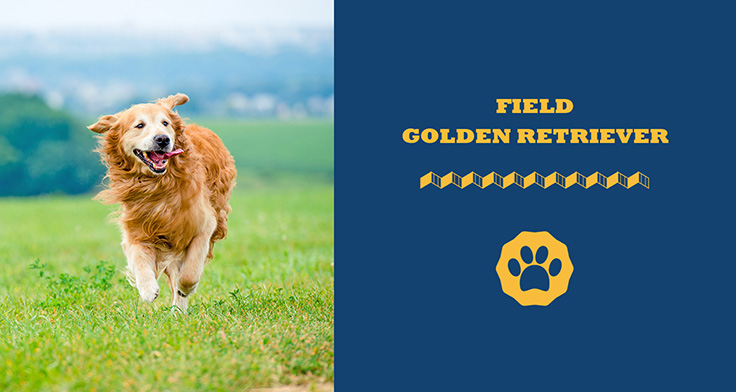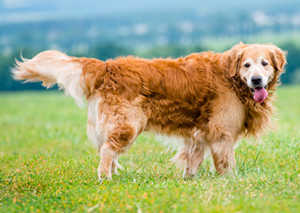Updated: October 13th, 2022
This article contains affiliate links. Read the full disclosure here.

If you are looking to welcome a golden retriever into your home, you may be surprised to find that there are different styles of goldens to choose from. If you are interested in this breed but are looking for something slightly different, the field golden retriever might be the perfect dog for you!
Before we get any further, it is important to note that field golden retrievers are, of course, still considered normal golden retrievers; they are just a different type of the golden retriever breed. While field golden retrievers and standard goldens are similar in many ways, they also have some notable differences.
In this article, I’ll tell you everything you need to know about field-bred golden retrievers and explain how they differ from standard show golden retrievers. Keep on reading to find out more!
What Is A Field Line Golden Retriever?

As you may have gathered from their name, field retrievers are a special type of golden retriever that are bred to hunt and be in the field all day.
When compared to other dog breeds, the history of the golden retriever is rather short and new. However, golden retrievers are one of the most popular dog breeds, regardless of the type and style of the retriever dog.
Born and bred in 19th century Scotland, the golden retriever breed was created by crossing the yellow retriever, Irish setter, Tweed water spaniel, and bloodhound dog breeds. As a mix of these breeds, the golden retriever is naturally highly skilled at fishing, hunting, swimming, and is bred for a more active lifestyle.
As a matter of fact, this is why the term “retriever” is used for the breed’s name, as goldens excel at retrieving show game and waterfowl. Field golden retrievers have a strong urge to fetch or retrieve things, which makes them an ideal choice for fieldwork.
While all types of golden retrievers are the same breed, show golden retrievers are bred for a specific look. A field retriever, on the other hand, is bred to hunt and work in the field all day long.
Field retrievers are bred to possess a specific personality and drive, while show goldens are specially bred to have a certain look that judges at the conformation shows expect based on the golden retriever breed standard.
Now, let’s talk about how these two types of retrievers compare to each other and the biggest differences between the two styles!
Field Golden Retrievers vs. Traditional Golden Retrievers
Since they are bred for a completely different purpose – fieldwork as opposed to the show ring – field golden retrievers look and act slightly differently than their conformist counterparts.
The field golden retriever is bred to have an athletic appearance. They are slimmer and smaller in size than the typical golden retriever and have a wiry body to run, swim, and jump all day if necessary.
Unlike the show golden retrievers who have block-shaped heads, field goldens have wedge-shaped skulls and longer muzzles.
Besides the different overall appearance, field retrievers also have darker coats that come in different shades from gold to red. Their coat is also shorter and not as dense as that of show golden retrievers.
Having a shorter coat means field golden retriever puppies shed less than traditional goldens. Since golden retrievers typically shed a lot, this can mean a world of difference, especially if you suffer from allergies.
In terms of personality, you can expect your field golden to be more driven and energetic than a traditional golden retriever. Like all other goldens, field-bred retrievers are also loving, affectionate, and eager to please, but they also like to play hard and move a lot.
Since they were bred to hunt in the field, field goldens have a ton of energy and enjoy all sorts of activities, from running and jogging to swimming and agility. Unlike other dogs, field goldens remain active and energetic into their adulthood and need regular exercise to stay healthy and content.
Show golden retrievers are also energetic dogs, but they can still settle down and cuddle with you while watching TV. The field retriever, on the other hand, will be more interested in playing with the best dog toys or excitedly running around the home.
As highly energetic dogs, field line goldens have high exercise needs as well, and they don’t fare well sitting in a house or apartment all day. Agile, athletic, and full of energy, these doggos need up to 90 minutes of vigorous exercise every day; otherwise, they will become restless and destructive.
If you’re considering getting a field golden as a pet, you should know that they are mouthy and tend to play rough. Their affinity to bite things comes from their breeding, as they were bred to retrieve shot game, so snatching things with their mouth is second nature.
While this rougher style of play can be problematic if you have younger kids, you can train your field golden not to bite during play. Start training your dog the appropriate non-biting behavior in puppyhood and make sure to invest in durable chew toys to keep your pup’s instincts in check.
AT A GLANCE: TOP 3 CHEW TOYS FOR OUR DOGS
- KONG Extreme Dog Toy – BEST OVERALL
- KONG Tires Dog Toy – RUNNER UP
- Petstages Dogwood Tough Dog Chew Toy – BEST BUDGET
Should I Get A Field Retriever?

If you lead an active lifestyle and are looking for a canine companion that can keep up with you on your adventures, then the field golden is the perfect dog for you! These highly energetic and agile dogs will jump on the opportunity to hit the trails with you or spend more time outdoors.
Field golden retrievers generally make wonderful family pets, but as I mentioned earlier, they tend to be mouthy. This combined with their endless supply of energy makes field golden retriever puppies a better option for adult-only homes or families with older children.
In homes with small children, all playtime must be supervised, at least in the beginning, to prevent injuries to both parties. As you start training your puppy not to bite and play gentler with your kids, you can gradually become more lax about regular supervision. Bear in mind that training your field golden not to bite or nip is going to take time, so don’t expect results overnight.
A great thing about this type of golden retriever is that they are highly trainable and are very focused on the task at hand. Like all other golden retrievers, field goldens are super smart, eager to please, and respond best to reward-based training and positive reinforcement techniques.
If the field golden sounds like the perfect canine for you and your family, you’ll probably have to look for a breeder that specializes in breeding field line retrievers. A reputable breeder will make sure their puppies have been to all necessary health checks before going home with you.
Since golden retrievers are one of the most popular dog breeds, finding a reputable breeder in your area shouldn’t be that hard. A good breeder will have the dog’s best interest at heart and will ask you various questions to see if you can provide a loving forever home for their dog.
FAQs About Field Line Golden Retrievers
How much do field golden retrievers cost?
The average price of field-bred golden retrievers varies a lot and can be anywhere from $1,000 to $4,000 when purchasing from a reputable breeder.
When purchasing a puppy from a breeder, ask to see health certificates for both puppies and their mother stating that they don’t suffer from any genetic health problems. The breeder should also have proof that their dogs have been x-rayed for hip dysplasia and that they don’t have any other health issues.
How long do field retrievers live?
Field golden retrievers have an average lifespan of 10 to 12 years. Bear in mind that this number can vary and depends on a lot of factors such as genetics, diet, exercise, and overall care. To keep your field golden healthy for as long as possible, take them to regular veterinary checkups, feed them a balanced diet, and care for them properly.
Do field golden retrievers make good pets?
Field golden retrievers generally make wonderful pets and companions to active people and families with older kids. Highly energetic, athletic, and smart, these dogs are best suited to outdoorsy and active people who will take their canines along with them on fun adventures.
While field goldens tend to play rough and are mouthy, they can be trained to curb their natural impulses with early training and proper socialization.
Conclusion
Both field golden retrievers and standard golden retrievers are the same breed, but they are two different styles of dogs. While show golden retrievers were bred for a specific look and are stars of dog shows, field retrievers are bred to hunt. These dogs were created to be in the field all day, running around and retrieving shot game. Their main selling points are:
- Highly trainable and eager to please
- Full of drive and desire to work
- Extremely energetic and playful
Do you own a field golden? What’s the thing you like the most about your dog?
Share your experiences owning this unique style of golden retriever with us and our readers in the comment section below!




2 Comments
Linda Howell
I have a field bred GR. I was not aware that’s what she was until I got her and started comparing notes with other puppy families how much she bit as a puppy and how energetic she was compared to my other, bigger golden. I’m not that outdoorsy or active as a person and I’m struggling with her. I just lost my husband so I’m single, working from home, and trying to figure out what to do with her.
Liza Powell
I’m sorry for the loss of your husband, and the difficulty with your field golden retriever. I have an 11 year old male golden, Oscar, and we brought a male field golden puppy, Skippy, into our family in March 2022. Skippy is 7 months old now. I hope you can find some of my experience helpful.
1) I thank God every day for Oscar’s help with channeling Skippy’s energy and modeling good behavior.
2) Unlike Oscar, Skippy doesn’t destroy toys and he spends a LOT of time playing with them when he’s inside and I can’t give him much attention. He amazes me with his ability to entertain himself by finding new ways to play with multiple toys at once. He’s ten times more interested in his toys than treats and meals, so I’m always on the lookout for new toys to add to his large collection.
3) When I have a lot to do inside I make time to take Skippy outside for a few minutes of playing fetch every hour or two. Even if I don’t have the energy to throw a ball far, Skippy is just as happy to fetch anything that I toss down the steps or just throw down hard enough to make it bounce a bit. There are several dog balls that are designed to bounce unpredictably which makes it even more fun for Skippy.
4) Skippy really likes relaxing on the sofa with a few throw pillows where he can see out the window. Somehow the throw pillows seem to be rather important to him.
5) I found that Skippy is a lot happier having the freedom to wander around the house, and can be trusted to behave, than he was when I tried to keep him in his crate during “down time”. He needs to be able to move around and have access to a bunch of toys in order to relax.
Last but not least, Skippy is not very responsive to me when I speak to him in a stern manner. But he is really responsive to me when I use a high pitched and enthusiastic voice. It’s easy to distract him away from something I don’t want him doing by saying something like “LOOK Skippy! I’ve got your squeaky toy over here!”
Good luck with your challenging situation and I wish you all the best.